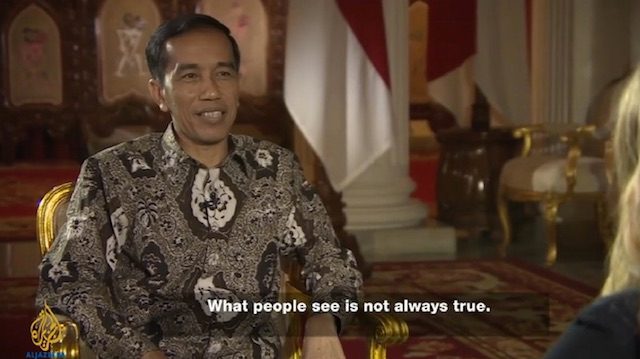SUMMARY
This is AI generated summarization, which may have errors. For context, always refer to the full article.

JAKARTA, Indonesia — Indonesia’s president invoked a national drugs crisis to justify this week’s execution of seven foreign traffickers, but analysts say it was more about a weakened leader acting under intense political pressure.
The execution by firing squad of two Australians, a Brazilian, four Nigerians, as well as one Indonesian, early Wednesday sparked an international furore, with Australia recalling its ambassador and UN chief Ban Ki-moon expressing deep regret.
However it was long expected after President Joko “Jokowi” Widodo, who took office in October, insisted that there would be no clemency for drug traffickers, shocking rights activists who had hoped the leader — viewed as a reformer — would take a softer line on capital punishment.
He has backed up his claim that Indonesia is facing an emergency with figures from the national anti-narcotics agency, which says that dozens of people are dying each day due to drugs and 4.5 million users are in need of rehabilitation.
(READ: Indonesia defends executions after convicts die singing)
While Widodo points to such figures, many analysts believe he was more motived by a desire to present himself as a tough leader and stave off pressure from nationalistic lawmakers and the influential head of his own political party after a series of political missteps.
“He understands that Indonesians want a firm leader, he wants to show that he is a firm president,” Yohanes Sulaiman, a political expert from the Indonesian Defense University, told AFP.
He added that during last year’s presidential election campaign, Widodo, a former furniture exporter, was often viewed as weak compared to his opponent, controversial ex-general Prabowo Subianto.
(READ: Indonesia does need death penalty to deter drug traffickers)
Damien Kingsbury, an Indonesia expert at Australia’s Deakin University, said that once Widodo promised to take a tough stance on drugs, changing course under pressure from Australia, which has been vocal in its opposition to the executions, would have been “political suicide”.
“Widodo — under domestic pressure from his party boss to stick to his own policy platform, and facing pressure bordering on hostility from the legislature with which he has to work — could not back down,” he wrote in a commentary for the Australian Broadcasting Corporation.
Out of his depth?
Widodo’s election victory last year was seen as a watershed moment for the world’s third-biggest democracy, fuelling hopes that the country’s first leader from outside the political and military elites would usher in widespread economic and social reforms.
But observers say the leader, a former governor of Jakarta with no previous experience in national government, has often seemed out of his depth in the corruption-riddled world of Indonesian politics, which remains dominated by figures from the autocratic past.
(READ: Who is Joko Widodo?)
Widodo faced his first real crisis when he sought to nominate a controversial former aide of his party chief, ex-president Megawati Sukarnoputri, as chief of the national police, raising questions about his commitment to fight graft.
The president eventually dropped Budi Gunawan after the popular anti-corruption agency named Gunawan the subject of a bribery investigation — sparking a row between the graft fighters and the police — but he was criticized for dithering.
He has also been accused of policy flip-flops, such as agreeing to increase the allowance given to lawmakers to make down payments on new cars to $15,000, double the previous amount. Following a public outcry, he scrambled to reverse the move.
In such a difficult environment, the chance of Widodo canceling the executions was low, analysts say, while a recent survey showed public support for putting drug traffickers to death at more than 84 percent.
Experts have also questioned the data that Widodo has relied on to back up the claim of a drugs crisis.
(READ: Indonesia uses faulty drug stats to justify death penalty)
In an analysis for Australian news website The Conversation, Claudia Stoicescu, a graduate student at Oxford University, noted that Widodo’s figures came from a study conducted by a university working for the anti-drugs agency, which she said used “questionable methods and vague measures”.
Of the 4.5 million people cited as drug users in need of rehabilitation, around 1.6 million were recreational users who had tried drugs fewer than five times in their lives, she wrote.
Despite the concerns, there seems little chance of Indonesia changing course any time soon, with the attorney-general declaring after Wednesday’s executions the country was fighting a “war” on drugs. —Rappler.com
Add a comment
How does this make you feel?
There are no comments yet. Add your comment to start the conversation.